Gut & Disease
Your gut is the foundation of good health. It is the centre of 60-70% of your immune system. The gut plays such an important role because it is a primary defense between the “outside” and “inside” worlds. The good bacteria that line the gut prevent potentially harmful bacteria from lining it instead.
If your gut is healthy, then chances are you will be healthy too. However, the reverse is also true and there is a condition called Intestinal Permeability (also known as Leaky Gut Syndrome or simply Leaky Gut) that can lead to a host of health problems.
Leaky gut affects 80-90% of people and it is the root cause of many diseases today. You might have it and not know it. So, let’s look at the facts shall we?
What Is Leaky Gut?
The most basic function of the cells that line the intestinal wall is to regulate permeability, deciding what materials pass through and what don’t. The gut is naturally permeable to very small molecules in order to absorb vital nutrients. Leaky Gut is basically the loosening of the junctions that make up the lining of the small intestine. The normal tight junctions between intestinal cells break apart, allowing undigested food particles, toxic waste, bacteria, and more to “leak” through the intestines into the blood stream, causing havoc on the immune system and leading to a variety of disease states.
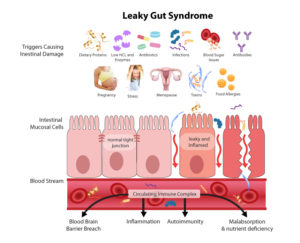
What Causes Leaky Gut?
The five main suspects are foods, gut infections, toxins, pregnancy and birth, and stress and age.
1. FOODS:
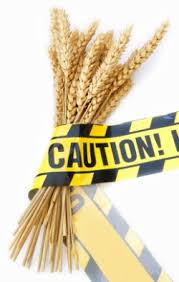 Gluten causes the gut cells to release zonulin, a protein that can break apart tight junctions in the intestinal lining. It is the number one cause of Leaky Gut.
Gluten causes the gut cells to release zonulin, a protein that can break apart tight junctions in the intestinal lining. It is the number one cause of Leaky Gut.
Gluten refers to a huge family of proteins. The most popular and most researched form of gluten is gliadin and it is primarily found in wheat. Traditional “gluten-free” products are usually only wheat, rye and barley free. However, there are over 400 forms of gluten. Gluten is also found in other grains such as corn, oats, millet, rice, sorghum, spelt, and pseudo grains, such as amaranth, buckwheat, and quinoa.
Technically, pseudo grains are gluten free. However, the processing of pseudo grains is often performed in facilities that also process other grain based foods. This is where cross contamination becomes a major issue.
TYPE AND AMOUNT OF GLUTEN IN DIFFERENT GRAINS
| GRAIN | PRIMARY FORM OF GLUTEN | PERCENTAGE OF TOTAL PROTEIN |
| Wheat | Gliadin | 69 |
| Rye | Secalin | 30-50 |
| Barley | Hordein | 46-52 |
| Oats | Avenin | 12-16 |
| Millet | Panicin | 40 |
| Corn | Zein | 55 |
| Rice | Oryzenin | 5 |
| Sorghum | Kafirin | 52 |
All grains cause inflammation and damage to some extent, along with digestion difficulty, vitamin/mineral deficiencies and autoimmune tendencies. The only true gluten-free way of eating is “grain-free”.
Other inflammatory foods like dairy or toxic foods, such as sugar and excessive alcohol, are also culprits.
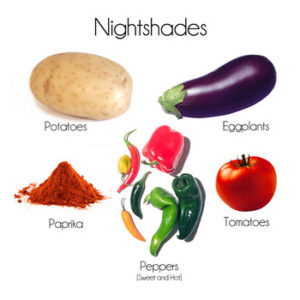 The nightshades family (eggplants, tomatoes, potatoes (not sweet), peppers, goji berries, and spices such as paprika, chilli, cayenne, curry) can be problematic for many people due to their alkaloid content. While the vast majority of people have no problems with nightshades, they can cause serious problems for some people who simply have a digestive sensitivity to them and for anyone struggling with an autoimmune disease. This is because these low-level toxins damage intestinal cells and increase the power of the immune response.
The nightshades family (eggplants, tomatoes, potatoes (not sweet), peppers, goji berries, and spices such as paprika, chilli, cayenne, curry) can be problematic for many people due to their alkaloid content. While the vast majority of people have no problems with nightshades, they can cause serious problems for some people who simply have a digestive sensitivity to them and for anyone struggling with an autoimmune disease. This is because these low-level toxins damage intestinal cells and increase the power of the immune response.
Lectins are sticky, carb-binding proteins which are also gut irritants in sensitive individuals. They are present in all plants and animal products. Foods with the highest lectin activity include grains (especially wheat), legumes (especially soy and peanuts), nuts, dairy, and nightshades.
Lectins’ stickiness allows them to bind with the lining of the small intestine, causing damage, impaired cellular function and “leakage”.
Eating too much processed food (especially GMOs), rather than real food, can also be a problem. In addition, incomplete chewing, inadequate stomach acids and pancreatic enzymes, and overeating all result in damaged intestinal walls.
2. GUT INFECTIONS:
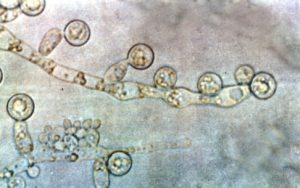
The most common infectious causes are Candida overgrowth, intestinal parasites, and small intestine bacterial overgrowth (SIBO).
3. TOXINS:
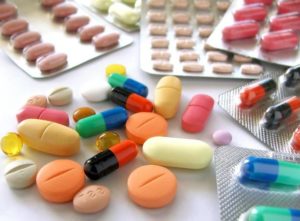
Toxins come in the form of medications, including NSAIDs (e.g. aspirin, ibuprofen), steroids, antibiotics, oral contraceptives, and antacids.
They can also be in the form of environmental toxins like mercury (from dental amalgams, seafood), tap water, pesticides, BPA from plastics, glyphosate (weed killer) and mycotoxins (mould, coffee).
Chemotherapy, radiation and surgeries are also factors.
4. PREGNANCY & BIRTH:

Babies born via C-section are deprived of their mother’s natural gut flora and can have altered gut development as a result (in particular low levels of healthy bifidobacteria).
Immunity is passed from the mother to the infant through her breast-milk which contains antibodies against specific antigens present in the immediate environment.
Introducing allergenic foods too early (especially grains) & failing to breastfeed may “turn on” genes that make the child susceptible to allergies later in life.
5. STRESS & AGE:

Chronic stress (both physical and emotional) produces cortisol imbalances which weaken the immune system. This leads to gut inflammation, which breaks the tight junctions of the gut.
Stress also causes the release of hormones which make blood sugar rise in the same way as a sugary snack. This “fight/flight” stress response is an evolutionary reaction from our ancestors’ time, when the extra blood sugar would have been needed to run away from danger.
The problem is nowadays stressful situations are the norm, so our blood sugar levels can be all over the place too.
When the perceived threat is gone, bodily systems are designed to return to normal function via the relaxation response, but in times of chronic stress, this often doesn’t happen enough, causing damage to the body.
Stress is also the number one cause of hormone issues in menopause.
Aging is also caused by inflammation, which is a result of oxidative stress and free radical damage throughout the body, including the gut.
The level of acid in the stomach declines as we get older, putting further strain on the gut. It can lead to vitamin and mineral malabsorption, poor protein digestion and an increased risk of gut infections.
12 Signs You Have Leaky Gut:
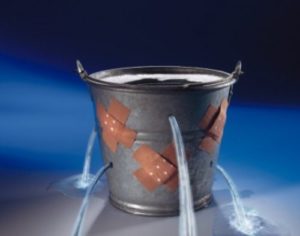
Your immune system marks “foreign invaders” as pathogens. These pathogens resemble tissues in the body, a process called molecular mimicry. Over time, the immune system turns on its own organs, tissues, including muscles, tendons, ligaments, bone, cartilage, and nerves, leading to an all out war against self.
The immune response to these invaders can appear in the form of any of the following twelve signs below. However, the resulting sicknesses are often treated without addressing the underlying Leaky Gut.
- Food allergies or food sensitivities
- Seasonal allergies or asthma
- Poor digestion, bloating, gas, constipation, loose stools, heartburn, irritable bowel syndrome (IBS), weight loss, nutrient malabsorption/deficiency or anaemia
- Inflammatory bowel diseases such as ulcerative colitis and Crohn’s disease
- Skin issues, such as eczema, psoriasis, rosacea, acne and age spots
- Mood disorders, including anxiety, depression, brain fog, memory loss, autism, ADD, or ADHD
- Hormonal imbalances (such as PMS or PCOS), excess weight, diabetes
- Chronic pain in joints and muscles, including arthritis, headaches and vertigo
- Thyroid issues such as hypothyroidism, Hashimoto’s thyroiditis or Grave’s disease
- Autoimmune disorders, including celiac disease, rheumatoid arthritis, osteoporosis or lupus (SLE)
- Adrenal fatigue, slow metabolism, frequent colds, gut infections (SIBO, candida overgrowth, parasites)
- Fibromyalgia or chronic fatigue syndrome
How Do You Heal Leaky Gut?
A multi-faceted approach must be taken to “fix” the Leaky Gut, along with a dose of patience since the condition has developed over time.
Common treatment utilizes a “4R” program to heal the gut. The steps are as follows:
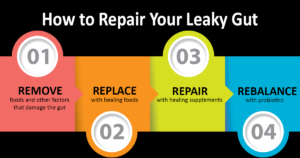
1. REMOVE
Remove the bad. Get rid of things that negatively affect the GI tract, such as inflammatory and toxic foods, hard to digest foods, intestinal infections and environmental factors.
2. REPLACE
Replace with good. Add back proper, healing and organic foods, and the essential ingredients for proper digestion and absorption, such as digestive enzymes, hydrochloric acid, apple cider vinegar and bile acids.
Incorporate some basic changes, such as chewing your food more thoroughly, to improve digestion. Replace trans fatty acids with healthier fats, such as omega-3 fatty acids (e.g. salmon, walnuts, chia seeds, flaxseeds, hemp seeds, eggs), coconut oil, olive oil, butter and avocados. Anti-oxidant rich fruits and vegetables are also essential, full of fibre (improving gentle elimination of toxins) and nutrients (which reduce inflammation).
Address any nutritional deficiencies through diet and supplementation, focusing on increasing antioxidant intake.
3. REPAIR
Repair the gut lining. Quiet the body’s up-regulated defence mechanisms and inflammation response, using specific foods and supplements that heal the gut wall.
This will aid proper digestion and absorption of nutrients. As a result, immunity will increase and the body will be able to protect itself again.
L-Glutamine, an amino acid, is essential in healing the intestinal lining more than any other nutrient.
Drinking bone broth (full of minerals, cartilage, amino acids, gelatin & collagen) will also help to heal the gut, as will supplementing with essential fatty acids (fish oils, coconut oil, olive oil), soluble fibre (psyllium), zinc and herbs such as slippery elm and aloe vera.
Exercise significantly reduces stress which in turn reduces inflammation and boosts the immune system. Meditation, prayer, restorative yoga or similar, breathing essential oils are all calming and peaceful, helping to manage anxiety, mood, sleep and energy.
Getting sufficient uninterrupted sleep (7-9 hours) can do wonders to repair and restore your system.
4. REBALANCE
Rebalance gut flora. Restore beneficial bacteria and proper digestive function with specific anti-fungal and probiotic-rich fermented foods and supplements. Probiotics, particularly Lactobacillus and Bifido bacterium, manufacture B vitamins, and increase the bioavailability of vitamins and minerals which are needed for absorption.
Based on all the information provided, I hope you now can see why it’s essential to heal Leaky Gut and how this syndrome can lead to many more serious disease states if left uncorrected.
The body is forced to respond full-time to the needs of the injured gut lining, with proteins and other resources being redirected from other basic growth and repair processes.
Addressing your digestive health and repairing a damaged gut is required in order to regain energy, improve nutrient absorption, repair a compromised immune system and recover from disease.
CLICK HERE for consultations with me….
